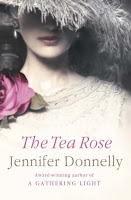I really enjoyed looking back on the books I had read when I did my last Friday's Five. So, I visited Steph's Stacks again this week, and thought "I must do another Friday's Five". Here's another list of five must-read books:
The Tea Rose and The Winter Rose by Jennifer Donnelley.
I wrote a note to myself after reading The Tea Rose, that it was a very smart book, in the way it combined a couple of historic events into the background of the novel. Ultimately, thought, this is a great love story. The love story spans over the two novels, so don't stop at the first one. The characters are so perfect, and can do no wrong, and seem to go from strength to strength (which can get annoying, and a little Mills and Boon). But who doesn't like a good romance?
The Guernsey Literary and Potato Peel Pie Society by Mary Ann Shaffer and Annie Burrows.
Ok, forgive me. Another love story in a historic setting. This book is very unique - written in letter form. It is also quite educational - about the occupation of Guernsey by Germany during WWII (which I knew nothing about). It kept me running to do research online. A worthwhile read.
Eucalyptus by Murray Bail.
An Australian novel. Like a fairytale. It is even more unique in the way it's written, and is a way of the author showcasing a lot of little short stories and fables that he has written. It is a strange love story - maybe because it's not written in a traditional sense, but is expressed very differently. The girl is a beauty, but is kept secluded by her father. Her father advertises that whoever can name all the eucalyptus trees on his property can marry his daughter. She is distraught by this, and eventually falls into a depression ... and only the man she loves can save her!
The Roving Party by Rohan Wilson.
Another Australian novel, this is the latest Vogel prize winner. This is not a love story. This is a story about humanity, about what men are made of, about the best and worst in us. It is about a roving party in early Australian settlement, who are formed to hunt and kill Aboriginals. The main character, though, is an Aboriginal himself, raised by white men. Really interesting character study of him, and how he doesn't fit in to either world, and his torn loyalties and mixed beliefs.
Mister Pip by Lloyd Jones.
This is set in Papua New Guinea during their civil war in 1990. It is about a school of young children whose teacher runs away, and all the school books are destroyed. A local white man (the only white man left on the island, in their view) takes on the role of the teacher and reads Great Expectations to them. The children can escape the atrocities around them by going into their English world which is so different from their reality, and they love Pip.

















